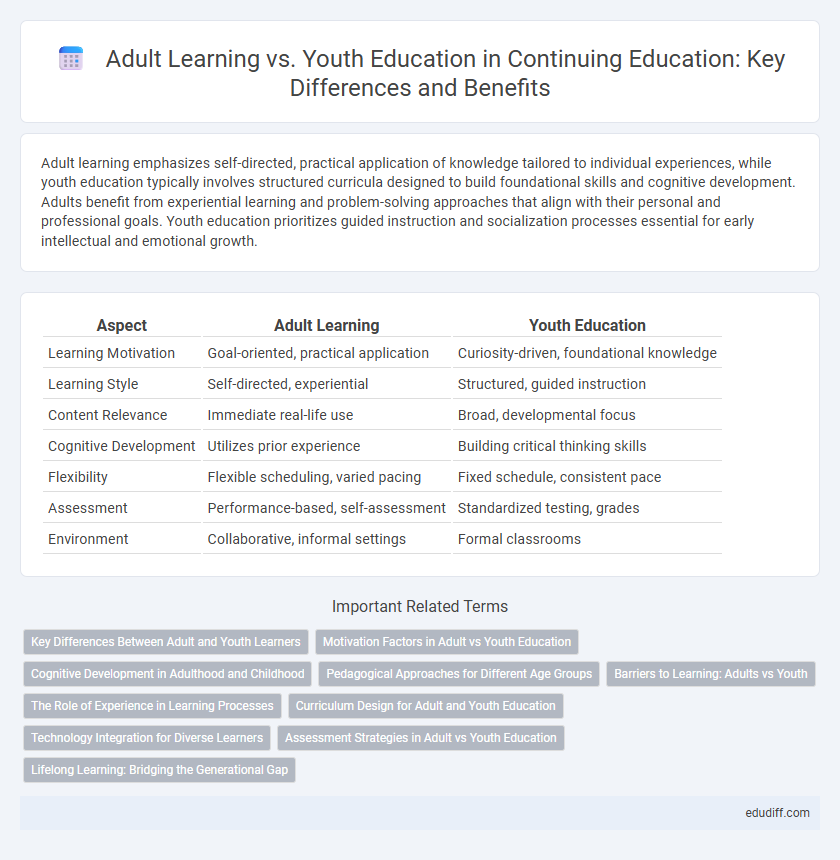Adult learning emphasizes self-directed, practical application of knowledge tailored to individual experiences, while youth education typically involves structured curricula designed to build foundational skills and cognitive development. Adults benefit from experiential learning and problem-solving approaches that align with their personal and professional goals. Youth education prioritizes guided instruction and socialization processes essential for early intellectual and emotional growth.
Table of Comparison
| Aspect | Adult Learning | Youth Education |
|---|---|---|
| Learning Motivation | Goal-oriented, practical application | Curiosity-driven, foundational knowledge |
| Learning Style | Self-directed, experiential | Structured, guided instruction |
| Content Relevance | Immediate real-life use | Broad, developmental focus |
| Cognitive Development | Utilizes prior experience | Building critical thinking skills |
| Flexibility | Flexible scheduling, varied pacing | Fixed schedule, consistent pace |
| Assessment | Performance-based, self-assessment | Standardized testing, grades |
| Environment | Collaborative, informal settings | Formal classrooms |
Key Differences Between Adult and Youth Learners
Adult learners exhibit greater self-direction and intrinsic motivation compared to youth learners, who often rely on structured guidance and external reinforcement. Cognitive development in adults supports complex problem-solving and practical application, whereas youth learners focus more on foundational knowledge and skill acquisition. The difference in life experience influences learning preferences, with adults favoring relevance and immediate utility while youth benefit from exploratory and social learning environments.
Motivation Factors in Adult vs Youth Education
Motivation in adult learning often centers on practical application and career advancement, driven by intrinsic goals such as personal growth and self-efficacy. Youth education motivation is typically influenced by external factors like grades, parental expectations, and social acceptance, which can shape engagement and persistence. Understanding these differing motivational drivers enhances curriculum design and instructional strategies tailored to each group's unique needs.
Cognitive Development in Adulthood and Childhood
Cognitive development in childhood is characterized by rapid acquisition of language, memory, and problem-solving skills, essential for foundational learning. In adulthood, cognitive processes emphasize critical thinking, experiential knowledge, and metacognition, supporting complex decision-making and lifelong learning. Neural plasticity remains active but shifts focus from acquisition to adaptation, impacting how adults and youth engage with educational content.
Pedagogical Approaches for Different Age Groups
Pedagogical approaches for adult learning emphasize self-directed, experiential, and problem-solving methods that leverage learners' prior knowledge and life experiences, ensuring relevance and practical application. In contrast, youth education often prioritizes structured curricula, foundational knowledge acquisition, and development of cognitive and social skills through interactive and scaffolded instruction. Tailoring teaching strategies to accommodate cognitive maturity, motivation, and learning context improves engagement and outcomes across age groups.
Barriers to Learning: Adults vs Youth
Adults face barriers such as time constraints due to work and family responsibilities, while youth often encounter challenges related to lack of motivation or inadequate foundational skills. Financial limitations impact both groups but tend to disproportionately affect adult learners seeking career advancement. Learning environments tailored to youth may not address the unique cognitive and emotional needs of adult learners, leading to reduced engagement and persistence.
The Role of Experience in Learning Processes
Experience significantly enhances adult learning by providing contextual understanding and practical application, which youth education often lacks due to limited real-world exposure. Adults draw on prior knowledge and life experiences to interpret new information, fostering deeper comprehension and retention. Youth education relies more on foundational skills and theoretical concepts, as students have less accumulated experience to integrate into learning processes.
Curriculum Design for Adult and Youth Education
Curriculum design for adult learning prioritizes practical application, self-directed study, and real-life problem solving to accommodate learners' prior experiences and busy schedules. Youth education curricula emphasize foundational knowledge, skill development, and structured guidance to support cognitive growth and socialization in early developmental stages. Effective curriculum design aligns with learners' cognitive levels, motivation, and learning goals to optimize engagement and knowledge retention across age groups.
Technology Integration for Diverse Learners
Technology integration in adult learning leverages adaptive platforms that cater to diverse learning paces and life experiences, contrasting youth education's emphasis on foundational digital skills development. Interactive tools such as AI-driven tutors and mobile learning apps enable adults to apply practical knowledge in real-world contexts, enhancing retention and engagement. Data analytics in educational technology also personalize learning pathways, effectively addressing the varied cognitive needs across age groups and facilitating lifelong learning.
Assessment Strategies in Adult vs Youth Education
Assessment strategies in adult learning emphasize practical application, self-reflection, and formative feedback, contrasting with youth education's focus on standardized testing, summative evaluations, and curriculum-based benchmarks. Adults benefit from experiential assessments such as portfolios, real-world problem-solving tasks, and peer reviews that align with their prior knowledge and life experiences. In youth education, assessments often prioritize knowledge recall, skill acquisition, and developmental milestones to gauge academic progress.
Lifelong Learning: Bridging the Generational Gap
Lifelong learning plays a crucial role in bridging the generational gap between adult learning and youth education by fostering continuous skill development and adaptability. Adults leverage practical experience and self-directed learning, while youth benefit from structured curricula and foundational knowledge. Integrating technology and collaborative platforms enhances intergenerational knowledge exchange, promoting inclusive education and workforce readiness.
Adult Learning vs Youth Education Infographic

 edudiff.com
edudiff.com